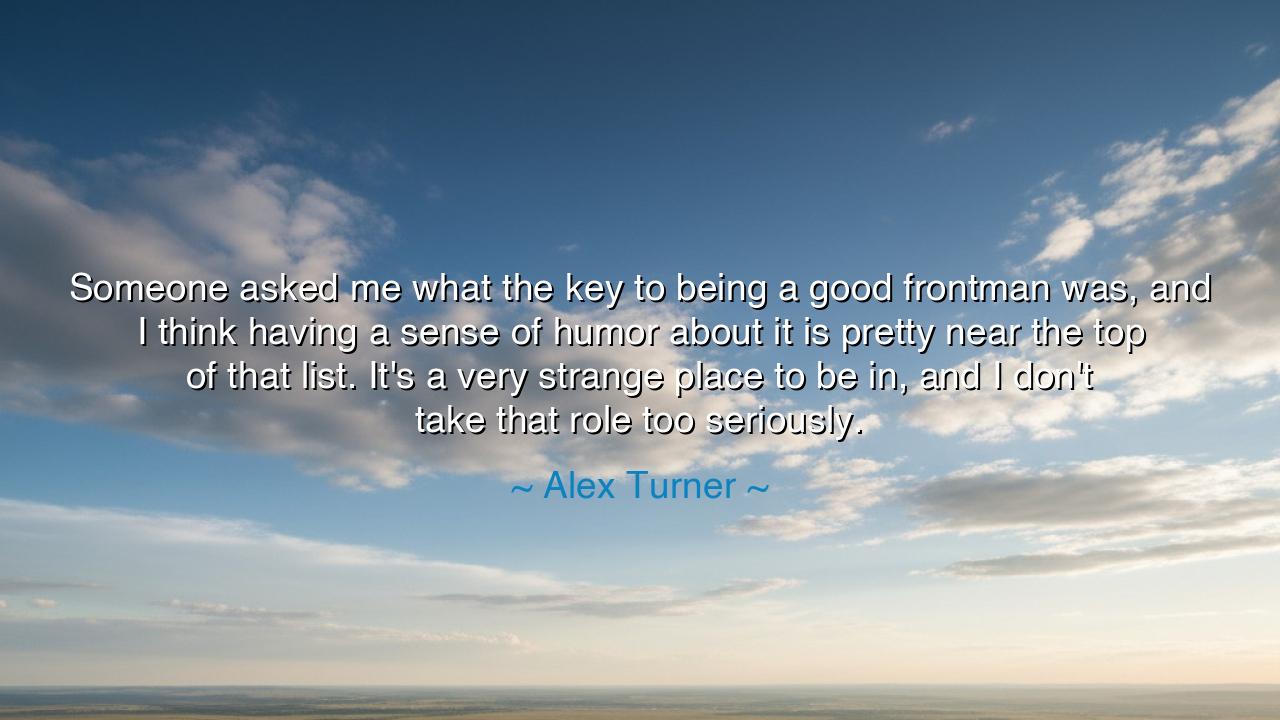
Someone asked me what the key to being a good frontman was, and I
Someone asked me what the key to being a good frontman was, and I think having a sense of humor about it is pretty near the top of that list. It's a very strange place to be in, and I don't take that role too seriously.






“Someone asked me what the key to being a good frontman was, and I think having a sense of humor about it is pretty near the top of that list. It’s a very strange place to be in, and I don’t take that role too seriously.” — thus spoke Alex Turner, poet of rhythm and voice, whose presence on the stage burns bright but whose words reveal the humility of one who understands the fragility of glory. Beneath the ease of his tone lies a truth as old as fame itself: that those who stand before others, whether to lead, to sing, or to speak, must temper pride with humor, and power with self-awareness. For to lead without laughter is to be consumed by the illusion of one’s own importance.
To be a frontman is to stand at the meeting point of light and shadow — to be both idol and mirror, adored yet observed, commanding yet exposed. Many who step into this place are tempted to take it too seriously, to let the gaze of the crowd shape their soul. But Turner, in his wisdom, sees that the only way to survive such strangeness is to carry within oneself a sense of humor — the divine ability to laugh at one’s own role in the great theatre of life. Humor here is not mockery, but balance; it keeps the ego from swelling and the heart from hardening.
To say “it’s a very strange place to be in” is to acknowledge that fame distorts reality. The stage, like power, magnifies everything — one’s gestures, one’s words, one’s flaws. Without humor, this distortion becomes unbearable. But laughter lightens the weight of the mask; it allows the performer to remain human beneath the lights. Turner’s humility — his refusal to take the role too seriously — is an act of quiet rebellion against the trap of vanity. It is a reminder that even in performance, the truest art is born from authenticity, not self-importance.
The ancients, too, spoke of this paradox. The philosopher Diogenes, though known as a beggar, mocked the kings and scholars of his time, showing them that wisdom without laughter was hollow. When Alexander the Great visited him and asked what gift he desired, Diogenes replied, “Stand out of my sunlight.” In that jest was a universe of truth: that no man, no matter how elevated, should forget his place beneath the sun. Likewise, Turner’s humor shields him from the blindness of adoration; it keeps him grounded in the shared absurdity of existence.
Consider also the tale of Charlie Chaplin, a man who, though he wore the mask of comedy, was one of the great philosophers of his age. Through laughter, he unveiled the cruelty of greed and the foolishness of pride. His art endured because it was rooted in the humility of humor. He knew, as Turner does, that to lead — whether in song or in spirit — one must be able to look at oneself and smile. For laughter is not the enemy of depth; it is its companion. It reminds both the artist and the audience that all greatness is fleeting, and all performance, however grand, is but a gesture in time.
The origin of Turner’s insight lies in the experience of standing before a crowd — that strange alchemy of energy and expectation that can turn any soul into a god or a ghost. He has seen both sides of fame — the glory and the isolation — and learned that only by keeping lightness of spirit can one endure its contradictions. His words are not merely for musicians, but for anyone who stands in a place of visibility — for leaders, teachers, dreamers, and all who seek to guide others. The key, he teaches, is not to lose the playfulness that first drew one to the art itself.
Let this be the lesson, O listener of wisdom: take your craft seriously, but never yourself. Whatever your stage may be — a concert hall, a classroom, a boardroom, or the quiet theatre of daily life — carry within you the grace of laughter. When pride swells, let humor deflate it; when fear rises, let humor dissolve it. Remember that life itself is performance — brief, strange, and full of wonder — and those who can laugh through it are the ones who truly live.
For as Alex Turner reminds us, the greatest performers are not those who believe themselves divine, but those who know they are human — flawed, funny, and fleeting. So lead with humility, create with joy, and let your laughter echo through the halls of your work. For laughter is the soul’s way of bowing before life’s mystery — and in that bow, both art and truth are born.






AAdministratorAdministrator
Welcome, honored guests. Please leave a comment, we will respond soon